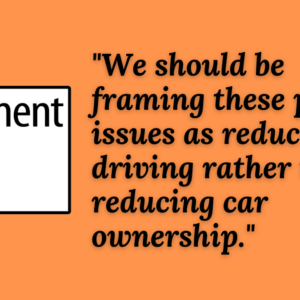
“Lesser Evil candidate knows they don’t have to be good, they just have to be slightly less evil than Greater Evil candidate.”
Welcome to the Comment of the Week, where we highlight good comments in order to inspire more of them. You can help us choose our next one by replying with “comment of the week” to any comment you think deserves recognition.
Everything I know I learned from the BikePortland comments section.
Okay, not really, but we do regularly get commenters who are quite knowledgeable about their subject—you can learn a lot from them even if you don’t agree with what they are saying.
In response to our post about City Council now appearing to support the I-5 Rose Quarter project, Damien grabbed the elephant in the room by the tusks. What do we have to do to get representatives who don’t just talk tough on climate change but actually follow through in their decision making?
Damien’s insightful comment points to voting (and just happens to be a nice follow-up to today’s article on charter reform). Here’s what Damien wrote:
Quite the contrary, dwk – supporting compromised candidates is what gets us bad candidates. It incentivizes it.
The problem with the “lesser of two evils” rationale/strategy is that it’s only rational in the context of one election. Over multiple elections, it’s a self-defeating downward spiral, i.e., it always leads to greater evil. Taken to its absurd conclusion, we eventually get a choice between, say, just for example’s sake, a mass-murdering psychopath who killed 100 people last week and a mass-murdering psychopath who killed 99 people last week, and well, you’d better vote for the 99-count murderer because they are the lesser of two evils. In the next cycle they’ll double those numbers, because Lesser Evil candidate knows they don’t have to be good, they just have to be slightly less evil than Greater Evil candidate.
Thank you, Damien, for the pushed-to-the-extreme example. You can read Damien’s comment and the full comment thread under the original post.







Thanks for reading.
BikePortland has served this community with independent community journalism since 2005. We rely on subscriptions from readers like you to survive. Your financial support is vital in keeping this valuable resource alive and well.
Please subscribe today to strengthen and expand our work.
The even more fundamental issue is that we’re stuck with the candidates who are actually willing to run, not the more idealized candidates we wish would run (or who get excluded because the party establishment supports its own, which is how we got Hillary Clinton* and Tina Kotek**, neither of whom might have made it without a friendly thumb on the scale).
It’s not that we end up with two largely indistinguishable mass murderers running for office, but rather a slate of bad choices (as we see in our race for governor).
Luckily it doesn’t work that way in practice. A much more realistic problem is ending up with two candidates on opposite extremes, nominated by their rabid bases. That can be (mostly) fixed with an open primary, reducing the role of political parties in electing leaders.
*Had Sanders won the primary, I think he would have beaten Trump. Clinton was uniquely vulnerable to Trump’s attacks.
**Kotek might have won anyway, but a fair fight would have made people like me feel more comfortable supporting her.
Hillary did win the vote and Bernie would have been crushed according to every single poll out there.
Open primaries only serve the candidates with the most money.
*** Moderator: deleted last sentence ***
Yes, Clinton won, but Debbie Wasserman Schultz, head of the party at the time, who was supposed to be neutral, gave her considerable support.
Closed primaries also favor well funded candidates.
She won the overall vote, but lost by the very narrowest of margins in the states that mattered most. I think by a total of 70k votes across 3-4 states if I am not mistaken.
It’s like a team winning a World Series despite being outscored badly.
Is there any example one can point to where not voting causes people to become less “evil”?
Generally, people running for office care about who actually votes. If people don’t vote (or don’t vote for a major candidate), future candidates will ignore those voters (and move toward the ‘center’ of those who vote).
Can you give an example where avoiding voting for one of two “evils” got a future candidate who was “good”?
No he can’t because there isn’t… This is just an embarrassing take, a high school debate topic.
JaredO, I read Damien’s comment less literally than you do, not as a prescription for how to vote when your ballot arrives, but rather an argument against our current system of winner-take-all runoffs between two candidates.
Plurality voting certainly magnifies the problem. A system like STAR or approval would, by eliminating the spoiler effect, do a great deal to free us from the lesser evil trap.
But if you take plurality as a given (such as it is in most places/elections in the US), I am quite literal – I will not vote for evil candidates, lesser or otherwise. In some races, that leaves me with no one to vote for. Not for most races, though – I usually just have to look farther down the ballot than the two choices the corrupt and deleterious major parties offer up.
But to clarify between Jared and Lisa – I vote every election.
I am almost certain this has never had a sustained attempt at scale, so my argument is purely logical, not empirical. The public is incredibly vulnerable to vote-splitting/lesser evil arguments, which isn’t an accident.
This was silly first time around…After 2016 and the Trump take over of the supreme court, this may be the dumbest take going right now.
Seriously, while you are waiting for the dream candidate, we are losing the country.
If Damien still thinks that there is no difference between parties in 2016 and now, you are the problem as far as I am concerned.
We have minority rule now, A senate that represents no one, A supreme court that has 5 members selected by a person who lost the popular vote…
What the hell are you waiting for?
The Senate represents the states. It was never intended to be a majoritarian or popular body (its members were originally appointed by the states). Majoritarianism is the House’s role.
If you want two majoritarian bodies, or to abolish the Senate, we need to change the Constitution.
Except the Senate role has changed from a deliberative body that debated and consented on the House bills to what is now just a partisan hack chamber that blocks legislation and has a silly 60 vote threshold left over from Jim Crow.
We have an outdated ridiculous constitution crafted by slave owners and it is what it is…it wont be changed.
We can change the way legislation is done, get rid of the filibuster which had no constitutional basis and start in the right direction.
The filibuster “rule” just keeps minority rule by a bunch of unpopulated States.
The senate can change the filibuster rule whenever they want with a simple majority vote. In other words, the supermajority requirement is controlled by a simple majority, and, like most senate rules, doesn’t require explicit constitutional authority.
I, for one, was very happy the senate had the filibuster rule when Trump was president and the house and senate were controlled by Republicans. Likewise, changing the constitution is meant to be hard, and it protects us against one party running roughshod over the other. Do you really want it to be easier, especially in this era of political insanity?
If, when Republicans are in control of everything (which is bound to happen sooner or later), I’ll support your efforts to repeal the filibuster.
If there was no filibuster rule there would be more urgency to elections, they might matter. With this stupid rule nothing changes and nothing get done which results in posts like Damiens…
If the Repubs had Senate control and no filibuster they would be accountable which they are not presently…
As much as they whine, they use the courts… they would pass a bill to outlaw abortion, they don’t have the guts…easier to use 3 bogus appointments to the court.
There is also easy fix without changing the constitution. Add DC, Puerto Rico as states as they should be, break California into 4 states which it should be and you add 12 senators which are probably mostly D and would balance states like Wyoming..
The Founders never envisioned that some states would have a million people and others 40 million with the SAME representation.
That’s your easy fix?
Compared to changing the constitution it is… These are all doable without doing that.. It is Especially easy to add states, we could do that tomorrow.
Hello Greater Idaho!
We should change the constitutation. State boundaries are mostly arbitrary, and any potential state changes (breaking up very populated states, combining sparsely populated ones, or even adding new states) would be so heavily politicized now that it would be very unlikely to happen. The structure of the Senate may have made sense 250 years ago, but it has little relevance now.
dwk, do you consider yourself a partisan Democrat? I use “partisan” in the original meaning, as in dedicated to the party.
Yes, the charter reform is super important to the future of Portland and everyone needs to vote for it in November. We will never have competent gov’t without it.
But this arcane comment about ranked-choice voting has WHAT to do with bicycling in Portland?
Oh, I see the word “cycle” appears in the comment – as in “election cycle.” So that must be it.
Voters vote for candidates that make laws that affect cyclists.
Do articles have to be solely about bike repair, bike rides, and bike activism to pass your judgement on what is published on a site you don’t own?
Not that I’d have chosen to spin off a new thread myself on my own comment, but while it’s here, I’ll paraphrase Lawrence Lessig: “Democracy reform may not be your top priority, but it has to be your first priority.”
American democracy has often, particularly in modern times, been plagued by a huge disconnect between the general desires of the public and actual political outcomes – Portland is currently no different.
Huh. Color me surprised at this highlight. Thanks, Lisa.
The challenging part about my argument here is thinking past one election cycle, because every cycle these days is primed to feel existential (and no doubt for some at the margins, every election is – don’t want to downplay that). But if we reward Lesser Evil candidates just for being not the Greater Evil candidate, there’s never any pressure or incentive to actually be good. The worse Greater Evil gets, the more room Lesser Evil has to be more evil than the last cycle (so long as they never surpass Greater Evil).